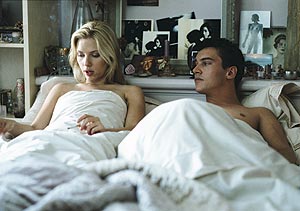
Critics are hailing Woody Allen's Match Point as a return to form. I'd say the bespectacled New Yorker has just double-faulted at love-forty down in the last game of the final set. Sadly, we're not talking about the final at Wimbledon either: this is an ignominious first round reverse in a meaningless veterans' competition at the tail-end of this once-brilliant auteur's career.
With Match Point, Allen has, at least temporarily, abandoned his beloved New York and relocated to England. If Allen's cinematic representation of his Manhattan milieu always seemed artificial, Match Point's "London" possesses insufficient depth to masquerade as one of Madame Tussaud's mannequins. Allen's London-lite lacks even the semblance of accuracy required to constitute caricature and should reconcile itself to a future in a child's pop-up book.
Even at the peak of his career (Manhattan, Annie Hall et alia) Allen's Gershwin-soaked sentimentality bore approximately as much relevance to contemporary New York as Vanilla Ice's oeuvre has contributed to the history of hip-hop. Even if Woody's rose-tinted spectacles compensated for crippling myopia, it was impossible not to exclaim "Get me a one-way ticket Woody World!" A world stuffed with ingenues who look like supermodels, talk like Dorothy Parker and are irresistably attracted to physically unprepossessing, but intelligent, older men says "ideal holiday destination" to me. Any passably-attractive, moderately-witty guy the right side of septegenarian would, surely, get more action in Allen's Mock Manhattan than Keanu Reeves might encounter in Surf City.
Match Point's not-so-naive neophyte looks like Scarlett Johansson, but talks like an android oscillating between pre-programmed "seductive", "insecure" and "possessive" modes. Sadly, Scarlett traversing the gamut of emotions from A to B is, by far, the most passionate aspect of the movie. She looks every inch the femme fatale and, compared to the lifeless cadavers who constitute the rest of the cast, just watching the divine Miss Johansson (even whilst spouting Allen's flat-lining dialogue) is an activity so overloaded with eroticism it must surely constitute voyeurism.
"Did anyone ever tell you you have sensuous lips?" is Chris' (Jonathan Rhys Meyers) opening gambit upon meeting the beguiling Nola (Scarlett). It's a perspicacious observation, equivalent to asking Pinocchio if anyone had ever commented upon his elongated proboscis, but it sets the tone for what follows: instead of a delicious medley of extemporanea, Allen serves up an unappetising plateful of predictability. The only appropriate response is a desultory backhand into the net. Unfortunately, the ball catches the top of the net, trickles over, and the plodding baseline rally that is this movie continues onwards, seemingly ad infinitum.
Match Point appears to be a meditation upon the capriciousness of chance, and the audience are left to reflect on the excessive misfortune heaped upon them as a result of merely electing to purchase a ticket for Allen's movie in preference to, say, Cheaper By the Dozen 2.
If Allen's dialogue is so bad it sounds like it's been translated into English from Aramaic, his depiction of London has all the depth and authenticity of a picture postcard painted by a Martian. This is a city presided over by a "sophisticated set" of power brokers who make Tim Henman look like John McEnroe. In a movie purged of wit, Allen has swapped the Algonquin Round Table for the Kensington Squares. This cabal of dispassionate, tennis-playing, opera-loving, nepotistic, financial market-dabbling, city slickers are wetter than monsoon season in Dhaka, but infinitely less potent. At an early stage in the proceedings we're told that Chris's dim-but-nice friend Tom's sister (soon to be Chris's wife) Chloe (Emily Mortimer) is "incredibly intelligent", but the rest of the movie fails to provide any evidence to support the proposition. Chris himself is, allegedly, a disadvantaged Irishman, but talks like a toff long before his assimilation by Chloe's family (the Hewitts, representing the aristocracy of Allen's Ersatz England).
Presumably, Allen expects us to buy into the idea that membership of this dispassionate clique is a prize to be coveted, but even Nick Leeson wouldn't invest one thin dime in the possibility that Chris would consider eliminating the only person who threatened to inject a hint of vitality into his life. Nevertheless, Chris is hell-bent on saving his loveless marriage, preserving the patronage of his inanimate in-laws and clinging to a job he's clearly unsuited for. What kind of monster would commit a crime of passion to safeguard such a dispassionate life? Quite clearly, if Chris had any cojones, he would have slaughtered the rest of the cast and headed back to the States with Scarlett.

No comments:
Post a Comment